In today's data-driven world, hiring a product analyst can give your company a competitive edge in understanding and optimizing product performance. They play a critical role in analyzing data to help teams make informed decisions, but many hiring managers often overlook the nuances of this role. Instead of just looking for technical proficiency, it's crucial to identify candidates who possess strong analytical thinking, communication, and the ability to translate data into actionable insights.
This article will guide you through the process of hiring a product analyst by exploring the key responsibilities, skills to look for, and the stages involved in recruiting one. We also provide links to relevant resources such as our interview questions and job description templates to help streamline your hiring process.
Table of contents
Why Hire a Product Analyst?
Start by identifying business challenges that a Product Analyst could address. For instance, you might need help optimizing your product's user experience or analyzing customer feedback to drive product improvements.
Consider these potential use cases for a Product Analyst:
- Conducting market research to inform product strategy
- Analyzing user behavior data to enhance product features
- Developing metrics to measure product performance and success
If you're unsure about committing to a full-time hire, consider starting with a Product Analyst assessment test to evaluate potential candidates. This can help you gauge the skills needed and determine if a full-time analyst or a consultant is the right fit for your current needs.
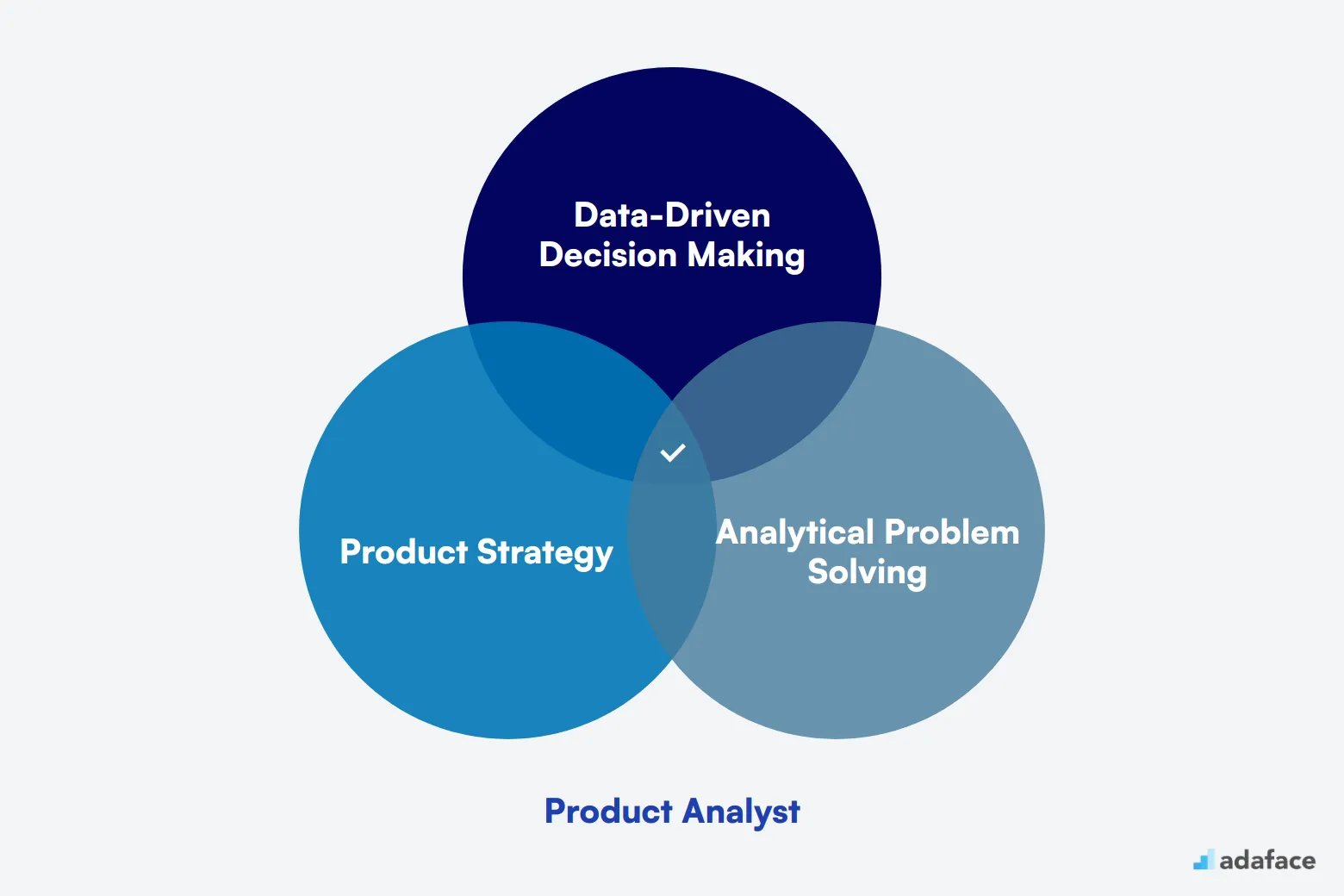
What does a Product Analyst do?
A Product Analyst helps companies understand their products by gathering and analyzing data to improve product development and business strategies. They work closely with product managers, developers, and other stakeholders to provide insights that drive decisions.
Typical responsibilities of a Product Analyst include:
- Gathering and interpreting data related to product performance and user engagement.
- Conducting market research to understand industry trends and consumer needs.
- Collaborating with cross-functional teams to assist in product development.
- Creating reports and presentations that summarize findings and suggest actionable steps.
For a deeper look at the skills needed for this role, visit our skills required for product analyst guide.
Skills and qualifications to look for in a Product Analyst
Hiring a Product Analyst requires a clear understanding of the skills and qualifications that are truly necessary for the role. Many recruiters often mix up what's essential with what's merely nice to have, leading to confusion in the candidate selection process. To help you out, here’s a breakdown of the must-have skills versus the preferred qualifications for an ideal candidate.
Required Skills and Qualifications
- Bachelor's degree in Business, Statistics, or a related field
- 3+ years of experience in data analysis or product analytics
- Proficiency in SQL and data visualization tools (e.g., Tableau, Power BI)
- Strong problem-solving and analytical skills
- Excellent communication and presentation abilities
Preferred Skills and Qualifications
- Master’s degree in Business Analytics or Data Science
- Experience with A/B testing and experimentation
- Knowledge of statistical programming languages (R or Python)
- Familiarity with machine learning concepts
- Experience in agile product development environments
| Required skills and qualifications | Preferred skills and qualifications |
|---|---|
| Bachelor's degree in Business, Statistics, or related field | Master's degree in Business Analytics or Data Science |
| 3+ years of experience in data analysis or product analytics | Experience with A/B testing and experimentation |
| Proficiency in SQL and data visualization tools (e.g., Tableau, Power BI) | Knowledge of statistical programming languages (R or Python) |
| Strong problem-solving and analytical skills | Familiarity with machine learning concepts |
| Excellent communication and presentation abilities | Experience in agile product development environments |
How to Write an Effective Product Analyst Job Description
Once you've defined the ideal candidate profile for your Product Analyst role, the next step is crafting a compelling job description to attract top talent. Here are some quick tips to make your Product Analyst job description stand out:
- Highlight key responsibilities and impact: Clearly outline the role's duties, such as analyzing product data, identifying trends, and providing actionable insights to drive product decisions.
- Balance technical skills with soft skills: List required technical proficiencies like SQL and data visualization tools, but also emphasize the importance of communication and problem-solving abilities.
- Showcase your company's unique selling points: Highlight exciting projects, growth opportunities, or your company's innovative approach to product development to attract ambitious candidates.
- Be specific about qualifications: Clearly state required education, years of experience, and any preferred certifications to help candidates self-assess their fit for the role.
Top Platforms to Source Product Analysts
Now that you have a well-crafted job description, it's time to post it on job listing sites to attract potential candidates. The right platform can significantly impact the quality and quantity of applicants you receive. Let's explore some top platforms for hiring Product Analysts.
LinkedIn Jobs
Ideal for posting full-time Product Analyst positions. Large professional network allows for targeted job listings and access to a wide pool of qualified candidates.

Indeed
Great for posting full-time Product Analyst roles. Wide reach and user-friendly interface make it easy to attract a diverse range of applicants.

Glassdoor for Employers
Effective for full-time Product Analyst listings. Allows companies to showcase their culture and benefits, attracting candidates who value transparency.
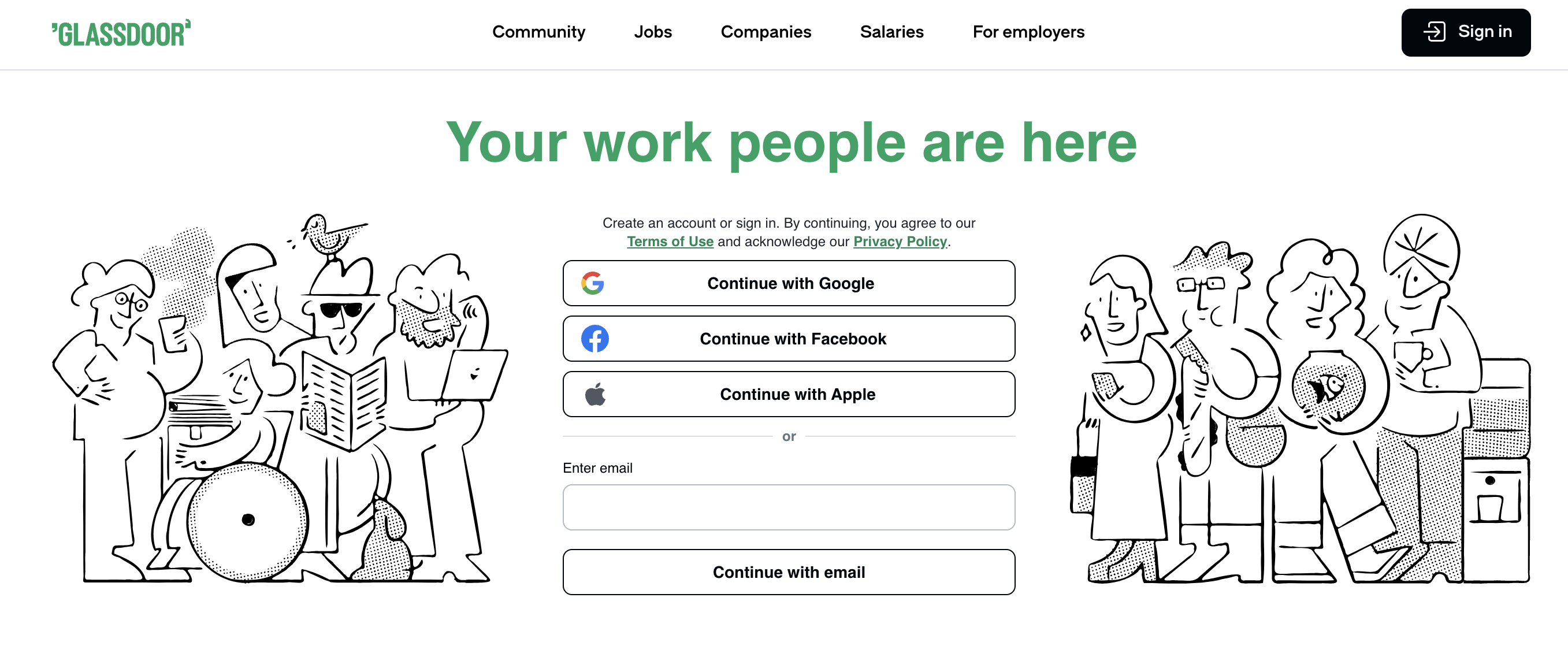
Beyond these popular options, there are several other platforms tailored to specific hiring needs. These include Upwork and Toptal for freelance talent, Remote.co and We Work Remotely for remote positions, AngelList for startups, Dice for tech-focused roles, and Kaggle for data-heavy analyst positions. Each platform offers unique advantages, allowing you to target your search based on your specific requirements.
How to Screen Product Analyst Resumes?
Resume screening helps hiring managers identify candidates with relevant experiences and skills without interviewing every applicant. This step acts as the initial filter, ensuring that only potential fits advance to the next stages of the hiring process.
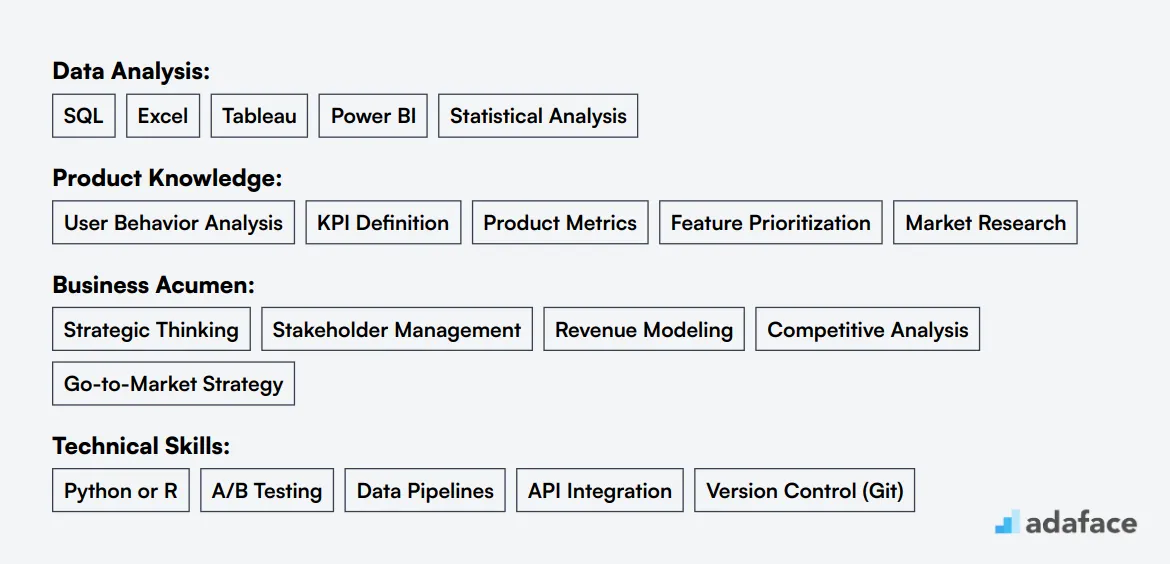
When manually screening resumes, focus on keywords that align with job requirements. For a Product Analyst, look for terms such as SQL, data visualization tools like Tableau, user behavior analysis, and A/B testing. Highlight resumes that encompass these must-have skills to streamline the selection process.
AI tools can be quite handy in filtering resumes efficiently. Use AI models like ChatGPT to identify key skills and qualifications in resumes. Input the desired keywords, and let the AI sift through the applicant pool, highlighting those who match your criteria.
Here’s an example prompt for AI screening:
TASK: Screen resumes to match job description for Product Analyst role
INPUT: Resumes
OUTPUT: For each resume, provide the following information:
- Email id
- Name
- Matching keywords
- Score (out of 10 based on keywords matched)
- Recommendation (brief recommendation of whether to shortlist this candidate or not)
- Shortlist (Yes, No, or Maybe)
RULES:
- If uncertain about a candidate's fit, assign a 'Maybe' instead of 'No'
- Keep recommendations concise.
KEYWORDS DATA:
- SQL, Tableau, Power BI
- Product Metrics, A/B Testing
- Python or R, Stakeholder Management
Recommended Skills Tests to Screen Product Analysts
When hiring a Product Analyst, it's important to go beyond resume screening and evaluate their skills thoroughly. Skills tests are an effective method to ensure candidates have the necessary abilities to excel in this role. Here are our recommended tests from the Adaface library:
Data Analysis Test: This test evaluates a candidate's ability to manually analyze and interpret data, a crucial skill for any Product Analyst. It assesses how well they can derive insights and make informed decisions from raw data.
Business Intelligence Analyst Test: Product Analysts need a good understanding of business intelligence tools. This test measures a candidate's proficiency in using such tools to create strategic insights, necessary for driving business decisions.
Data Interpretation Test: Understanding and interpreting data accurately is essential for a Product Analyst. This test checks how effectively a candidate can comprehend data visualizations and draw conclusions, which is vital for making data-driven decisions.
Problem Solving Test: Product Analysts often face complex challenges that require innovative solutions. This test gauges a candidate's ability to think critically and solve problems efficiently, which are key attributes for success in this role.
Data Science Test: While not every Product Analyst is a data scientist, having a good grasp of data science principles can be beneficial. This test assesses a candidate's understanding of data science concepts, which can be a valuable asset in their analytical toolbox.
Structuring the Interview Stage for Hiring Product Analysts
Once candidates pass the skill tests, the next step is to move them to the technical interviews where their hard skills and domain knowledge are evaluated. Skill tests are excellent for filtering out unfit candidates but are not sufficient in identifying the best fit for the role. During the technical interview, it's crucial to assess their understanding of product analysis and ability to apply their skills to real-world problems.
Here are some example interview questions to consider for a Product Analyst: 1. Can you describe how you would approach a product data analysis project? This assesses their systematic approach to problem-solving. 2. How do you prioritize tasks when working on multiple projects? This is important to understand their time management skills. 3. What tools do you prefer for data visualization and why? Evaluates their proficiency with necessary tools. 4. How would you handle a situation where product data conflicts with stakeholder expectations? Tests their communication and negotiation skills. 5. Can you explain a time when your analysis directly impacted product strategy? Allows them to demonstrate their impact. For more insights on this role, explore the skills required for product analyst.
What is the Cost to Hire a Product Analyst?
The cost to hire a Product Analyst can vary significantly based on location and experience. In the United States, the average salary is around $95,600, but it can range from $72,778 in Buffalo, NY to as high as $199,122 in Oakland, CA. In Australia, salaries average around AUD 93,425 with variations from AUD 62,558 to AUD 128,861, depending on the city. Understanding these salary differences can help you attract the right talent for your team.
Product Analyst Salary in the United States
The average salary for a Product Analyst in the United States is approximately $95,600. Salaries can vary widely depending on location, with positions in cities like Oakland, CA reaching up to $199,122. On the lower end, roles in Buffalo, NY may pay around $72,778. Understanding these variances can help you set competitive salaries that attract top talent.
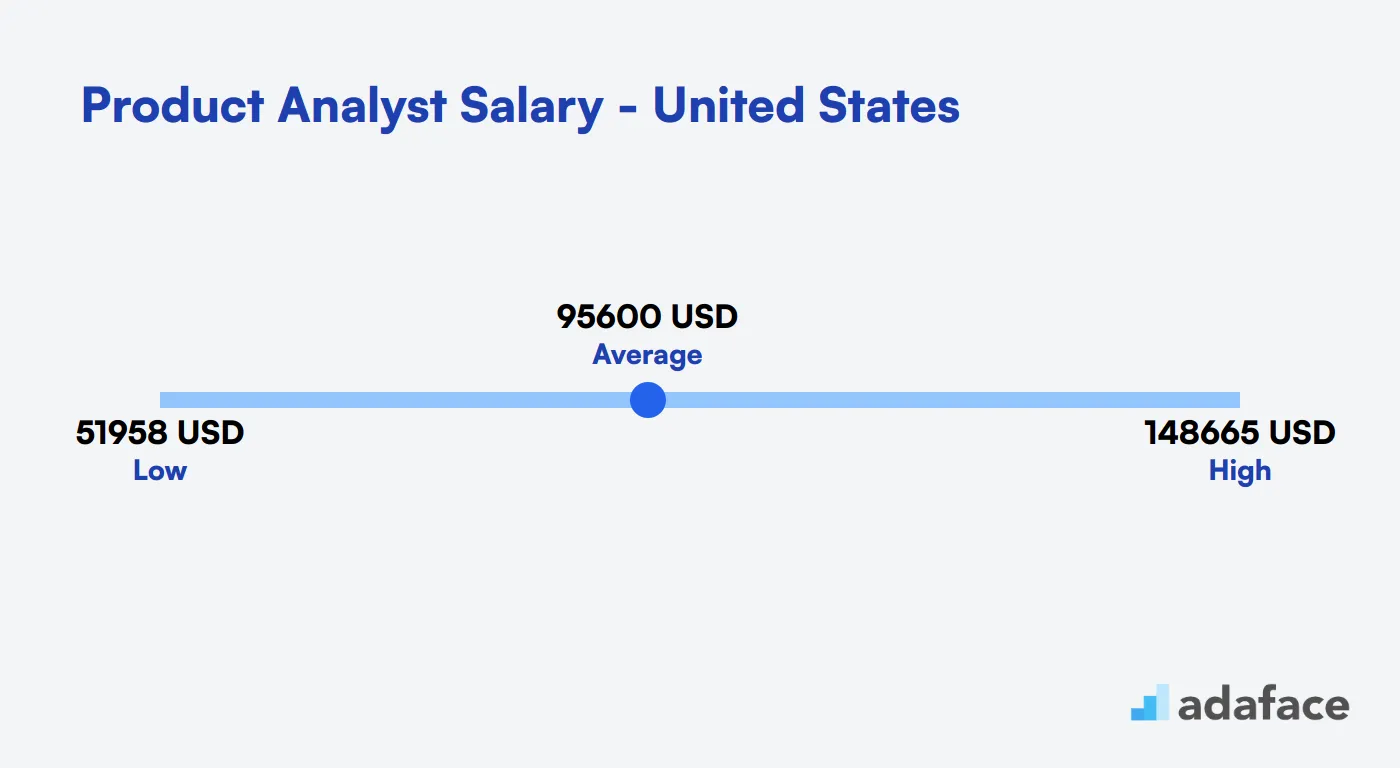
Product Analyst Salary in Australia
In Australia, Product Analysts can expect competitive salaries. The average salary for this role is around AUD 93,425, with a range typically falling between AUD 62,558 and AUD 128,861.
Location plays a significant role in salary variations. For instance, Product Analysts in Melbourne tend to earn higher, with a mean salary of AUD 113,588, while those in Sydney average around AUD 93,571.
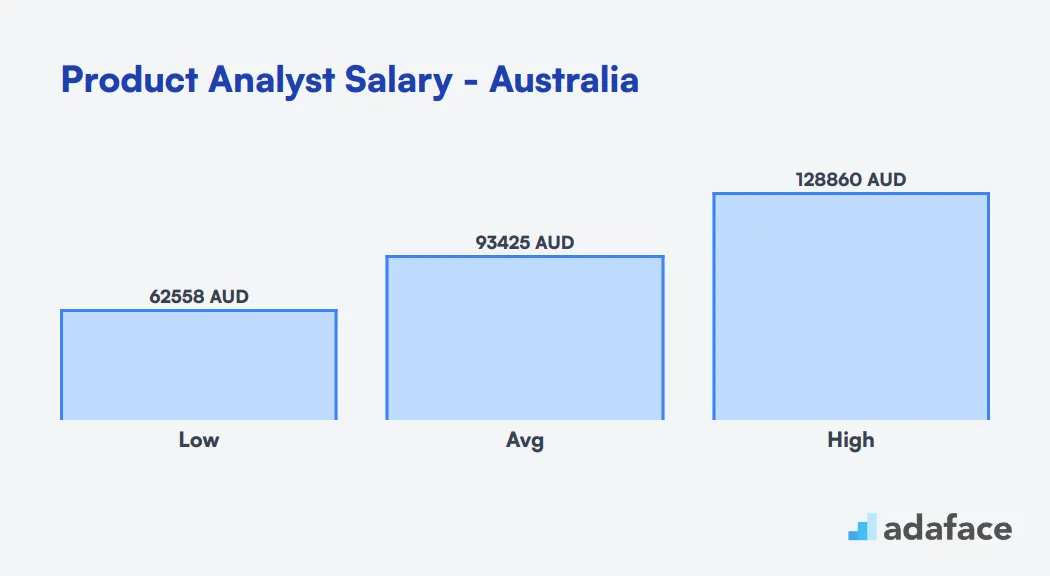
Hire the Best Product Analysts
Throughout this blog post, we've explored everything from the importance of hiring a Product Analyst to understanding their role and qualifications. We've also discussed effective job descriptions, sourcing platforms, and the costs involved in the hiring process.
If there's one takeaway to ensure successful hiring, it's to focus on creating accurate job descriptions and using skills tests to screen candidates effectively. Consider utilizing a Product Analyst assessment test to pinpoint the right skills needed for your team. By doing so, you'll be better positioned to hire a Product Analyst who truly aligns with your organizational needs.
Product Manager Online Test
FAQs
Look for strong analytical and quantitative skills, proficiency in data analysis tools, excellent communication abilities, and a capacity to turn data insights into actionable product strategies.
Clearly outline the responsibilities, required skills, and qualifications. Highlight any specific tools or methodologies they should be familiar with, and emphasize your company’s values and culture.
Utilize online platforms such as LinkedIn, industry-specific job boards, and recruitment agencies. Networking events and employee referrals can also be effective sources.
Use a combination of resume screening, skills tests, and behavioral interviews to assess the candidate's technical skills, problem-solving abilities, and cultural fit.
While industry experience can be beneficial, focus on the candidate’s analytical skills and ability to learn quickly. A strong analyst can adapt their skills to different industries.
Include a mix of technical questions, problem-solving exercises, and case studies related to your industry. Assess both their analytical skills and their ability to communicate findings effectively.
Research current market trends and salaries for product analysts in your region. Consider offering additional benefits such as professional development opportunities and flexible working arrangements.

40 min skill tests.
No trick questions.
Accurate shortlisting.
We make it easy for you to find the best candidates in your pipeline with a 40 min skills test.
Try for freeRelated posts
Free resources



